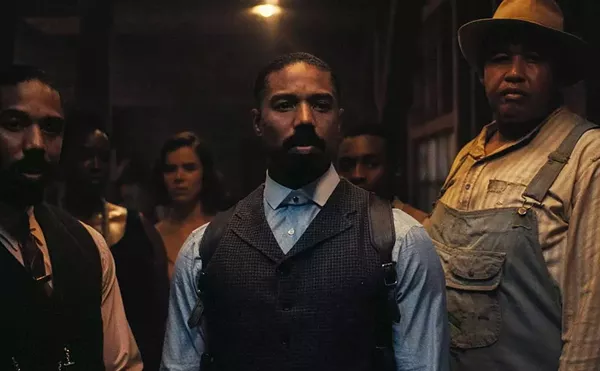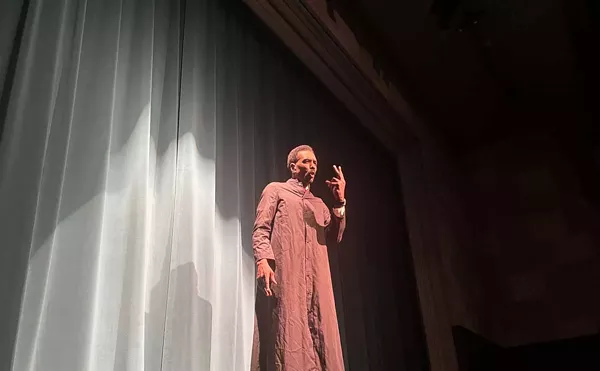
Audio By Carbonatix
[
{
"name": "GPT - Leaderboard - Inline - Content",
"component": "35519556",
"insertPoint": "5th",
"startingPoint": "3",
"requiredCountToDisplay": "3",
"maxInsertions": 100,
"adList": [
{
"adPreset": "LeaderboardInline"
}
]
}
]
The I-75 exit at Mack hardly looks like paradise, but until the 1960s it was just that, at least for some — the center of Detroit’s Paradise Valley, one of the pre-eminent hubs for African-American culture during the first half of the 20th century. Just two blocks away from what is now a drab stretch of pavement was one of the area’s 17 nightclubs, the Chocolate Bar, nestled off Hastings Street.
Ask any longtime Detroiter about Hastings Street and they’ll tell you of a bustling commercial and entertainment district that ran clear to downtown. That is, before the freeway came and gutted the street and the neighborhood.
As for swing and ragtime, Detroit was the real deal in 1941. The cool textures of jazz and blues greats visiting Detroit made Paradise Valley the place to be for any purveyor of culture. For a minute, imagine a jazz band, a sophisticated crowd that never seems to thin, a little underworld mischief and a strong woman holding court as leading songbird in a brought-back-to-life Paradise Valley. That’s Detroit playwright Odell Waller’s vision in his new musical, Trouble in Paradise Valley, which opened last week at the newly renovated Paul Robeson Theatre in Detroit’s Northwest Activity Center.
Waller’s tale is loosely based on his affection for Casablanca and film noir. In Trouble in Paradise Valley, detective Zack Monday (Dexter Mays) is on the case as much as he is concerned with his tumultuous love life. The musical is set entirely at the Chocolate Bar, fictional character Savannah McCrae’s swingin’ establishment.
Savannah is played by Detroit jazz vocalist Naima Shamborguer, who was an inspiration for Waller’s fifth play, he says. Shamborguer’s credits include work with Duke Ellington, Teddy Harris and Donald Walden.
“I knew the type of person … Savannah should be a woman of all ages,” says Waller. “I think she’s a very strong character, gutsy and opinionated.”
Waller relied on conversations with former Paradise Valley residents and historian Don Desjardins, as well as famed exotic dancer Lottie the Body, to weave historical threads through his play.
With an emphasis on renditions of classic jazz cuts like “Come Fly with Me” by Savannah and Bill Cole (Robert McCarther), a tap number by Ricky Williams, and a cast of dancers choreographed by Gina Ellis, the work comes across more like a vaudeville review than a traditional musical. Completing this imagery is Savannah’s accompanying band — jazz musicians Charles Boles, Charlie Gabriel, Vaughn Klugh, Rayse Biggs, John Dana, George “Saxman” Benson and Bert Myrick, who share the stage with the cast. Perhaps Waller intended the spirits of Cab Calloway and Count Basie to simmer in the context. Both played the Paradise Valley circuit. (Incidentally, Waller’s uncle Maurice King performed with Count Basie; Boles and Gabriel actually played in Paradise Valley clubs.)
As for the play, typecast characters round out a story that brims with seediness, intrigue and scandal. At the onset, Monday declares his retirement from his detective days in light of his pending engagement. When his nephew, Butch (Fonte Conard) turns up missing, Monday is pulled back into the adrenaline rush of super-sleuthing.
Comedy intercedes with Waller’s assembly of strong female leads, like the cigar-smokin’ mob boss lady (Savannah) who is on the hunt for a good man and a savvy journalist who dresses like a man to get the job done. Nkenge Zola shows up as a wicked catfish heiress.
Savannah is a conniver, and to win back her man feigns involvement with Monday’s old cohort, Ben Turpin (Brian Johnson), the controversial cop who kept order in the Black Bottom and is an actual character in Detroit lore.
The storyline uses lighthearted humor to string together clues in Monday’s elusive case, offset by Savannah’s bluesy heartache over his proposal to a haughty socialite. The socialite’s character is a delicious foil, until she is removed from the mix by having an affair with a womanizing reverend (George Shamborguer, Naima’s real-life husband).
In Waller’s work, the ladies run the joint as villains and heroes. The real villain is a mysterious lady whose ties go way back in Valley history.
Like many Detroiters, Waller grew up with the rich oral histories of the Black Bottom. The segregated area in downtown Detroit, about where the Lafayette Park area now sits, was once labeled a city within a city, home to 120,000 African-Americans, Hastings Street and, at the time, the largest number of black-owned businesses in the country.
Waller rejects the historical tidbit that Black Bottom was named for the rich soil in the area. “The reason it was called Black Bottom is that it’s where black people lived. I prefer to trust memories,” he says.
With Trouble in Paradise, Waller succeeded in creating an evolving work that is fast-paced and palatable, a glimpse into the Detroit of yesterday, a forgotten era, but one that has left an imprint on the Detroit aesthetic and on American culture.
Show at 4 p.m., Sun. Nov. 30, at the Charles H. Wright African American Museum, 315 E. Warren Ave., Detroit. At the Northwest Activity Center, the play shows at 8 p.m. on Dec. 5 and 6, and at 4 p.m. on Dec. 7. Tickets are $25. The Northwest Activities Center is at 18000 Meyers, Detroit. Call 313-863-7168 for more information.
Tamara Warren is a freelance writer. E-mail letters@metrotimes.com




